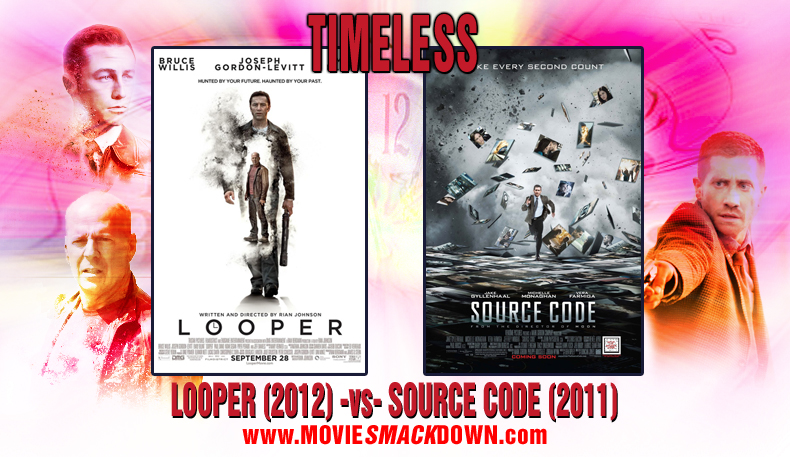
The Smackdown
Let’s face facts: If “traveling back in time to change the past” movies stuck rigidly to actual logic, there would be no such movies. As far as I can tell, there’s just no getting around the paradox that if you travel back in time and change the past, you alter history in such a way that you no longer have a reason, in the new timeline you’ve created, to get in a time machine and go back and change the past. For starters.
Fortunately, the best examples of the genre wisely choose to ignore this little snag and do the next best thing: Pour their energy into making it so entertaining and zanily convoluted that it doesn’t even occur to you to mind until you’re on your way home. The last decade, in fact, has seen a wealth of intriguing time-travel flicks that do exactly that, largely thanks to the fact that time travel doesn’t always require expensive special effects and thus can be done independently; all you need is a convincing-looking time machine prop and a lot of ingenuity, and presto, you got yourself a “high concept indie,” be it the soft-spoken, cerebral Primer (2004), the ruthless Spanish mind-bender Timecrimes (2007), or the diabolically clever Triangle (2009) (which doesn’t actually involve a time machine at all, but otherwise fits the category).
This year alone has already brought us the slight but sweet Safety Not Guaranteed, and the latest release Looper, the much-anticipated futuristic thriller from Rian Johnson, the wunderkind writer-director behind the brilliant teenage noir Brick (2005) and the ornate but overly precious con game comedy-romance The Brothers Bloom (2008).
Does the new one live up to the hype? We’re putting it to the test against The Source Code (2011), one of the most successful time-travel yarns of recent years. The only caveat is, whichever one loses will probably just go back in time and eliminate the winner… except wait, then how would they have…?
Oh, never mind. Let’s just do this thing.
The Challenger
As Joe (the ubiquitous Joseph Gordon-Levitt) explains in terse voice-over, forensics in the year 2074 has gotten so advanced that the only reliable way to get away with killing someone is to pop him in a time machine and send him back 30 years, where a “looper” such as Joe awaits with a loaded blunderbuss at the ready. Basically, this makes for the world’s easiest assassination gig, the only catch being that once in a while, a looper gets put in the position of having to close his own “loop” by shooting his 30-years-older self, and if you have a soft spot for yourself and let him escape, well… you’ll be given a rather unsympathetic severance plan.
Thus, when 2074 Joe (Bruce Willis, pushing 60 and still bad-ass) shows up, outruns his young self and gets away, suddenly it’s a big cat-and-mice polygon, with young Joe’s looper colleagues chasing him while he chases old Joe, who is on a personal mission to find and kill the child destined to grow up to be the evil crime kingpin known as “the Rainmaker.” Somehow amid all the craziness, young Joe also finds brief romance and familial warmth with Sara (Emily Blunt), a feisty single mom living in an isolated farmhouse with her precocious young son Cid (the astonishing Pierce Gagnon).
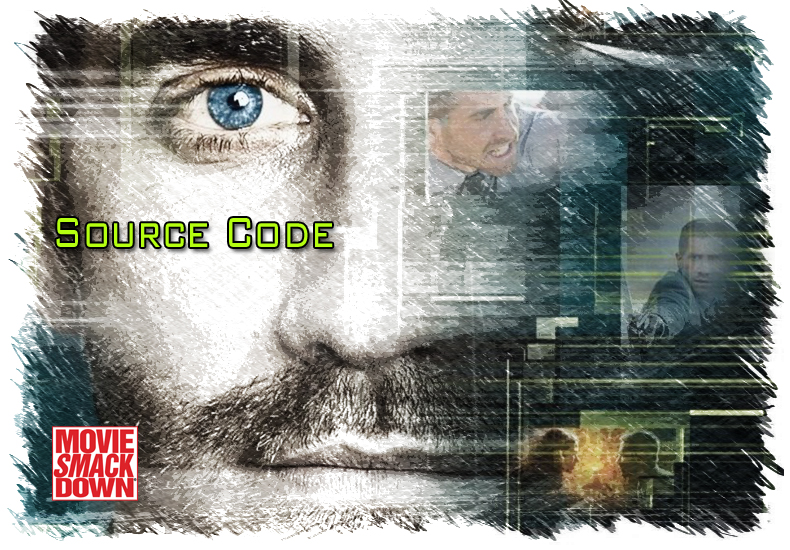 The Defending Champion
The Defending Champion
Who blew up the train, and can we go back and stop him before he does it? That’s the central question repeatedly put to Colter Stevens (Jake Gyllenhaal), a dedicated Marine who abruptly finds himself the subject of what at first seems to be a test but soon reveals itself to be a rescue mission. It turns out that the officious and enigmatic Dr. Rutledge (Jeffrey Wright) has invented a way not only to preserve the memories of the final eight minutes of a teacher riding a Chicago “el” train shortly before a bomb destroys it and all its passengers, but to insert Stevens into the dead man’s body to relive (and relive and relive) those minutes in order to learn the identity of the bomber and relay it back to sympathetic army scientist Colleen Goodwin (the invaluable Vera Farmiga).
What follows, then, is a sort of action-packed Groundhog Eight-Minutes. The teacher’s final moments get repeatedly revisited, with Stevens modifying the experience each time as he learns more about his mission and the other passengers (as well as his own current situation). Of particular interest is his comely traveling companion Christina (Michelle Monaghan), whose affection and appeal the teacher has been blind to, because clearly the teacher was a bit of an idiot.
The Scorecard
It is no small feat for both of these movies to be so entertaining and expertly made that we can almost entirely forgive them for being so preposterous. Does it make any sense at all that a looper would be assigned to kill himself, the one victim that said looper would ever have any motivation not to kill? Or that the 2074 gang captures its victims at gunpoint, despite the whole idea being that you can’t kill anyone in this world because you wouldn’t get away with it? Likewise, even if you could inject one man’s “soul” into another man’s final memories and gather information from them, how exactly would this enable anyone to actually change the past? But such movies are far less about making actual sense than they are about convincing you they make sense long enough to keep you nailed to your seat, and in that sense, both these films succeed wildly.
Looper is the headier, more ambitious trip, one that creates a convincing futuristic world without overly drawing attention to its elaborate details (the way, say, Len Wiseman’s dismal Total Recall remake seemed to exist mostly in hopes of an art direction Oscar). As with his stunning debut Brick (also starring Gordon-Levitt), Johnson proves himself a meticulous craftsman on every level, one who seems to put extensive consideration into each character, set, prop and line of dialogue, the way the Coen Brothers (and, sadly, too few others) do. There are plenty of slick chase scenes and gun battles to satisfy the action fans, but more impressively, the complex and thoughtful script manages to give both Joes such strong motivations that we sympathize with both of them, even when their goals are entirely at odds, building to an explosive climax that satisfies both visually and emotionally.
The Source Code also eventually reveals some poignant elements that elevate it above standard popcorn fare. How the film manages to create a convincing romantic subplot for Stevens despite having him chat with the love interest for only a minute or so at a time is difficult to explain, but it works, thanks largely to Ben Ripley’s endlessly inventive script and the zippy, expert direction of Duncan Jones (in his second feature, after the offbeat clones-in-space indie, Moon). It also helps that Monaghan is, as always, irresistible. Gyllenhaal anchors all this quite solidly, giving us a strong action hero who is likable, good-humored and, we recognize immediately, innately decent.
Looper, on the other hand, is more of a redemption story, its protagonist more of a noirish anti-hero, consumed by vices, prioritizing his savings of blood money over his friend’s life. He is so cold-hearted, he tells his older self to “do what old men do and die already.” But the ever-reliable Gordon-Levitt, even from behind a face full of Bruce Willis-esque prosthetics, manages to make him an affable rogue in spite of his flaws. His eventual redemption, thanks to the influence of his new-found “family,” is believable and packs an unexpected wallop.
The Decision
Two films with clever premises, terrifically tense action, touching romance and emotional heft? For pete’s sake, see both of them. Looper is the more exotic dish of the two; it has a singular style and vision that is rarely seen in movies of this scope and budget, managing to be a crowd-pleaser without feeling like it’s trying to be. It appeals to the mind and the senses, as opposed to Source Code, which is more of a fun, Hollywood-ish roller-coaster ride, albeit an unusually good one. The earlier film has a warmth and winning charm to it that Looper largely eschews in favor of an iciness that only gradually melts away, making it not necessarily for all tastes. Ultimately, though, while both films thoroughly entertain from start to finish, only one of them feels not only masterfully crafted but poured from the soul of a genuine artist, and that would be Rian Johnson’s Looper.


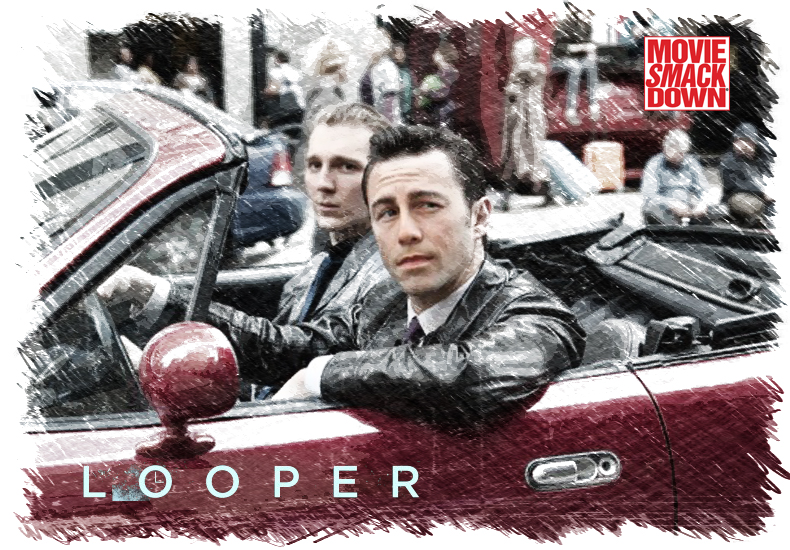



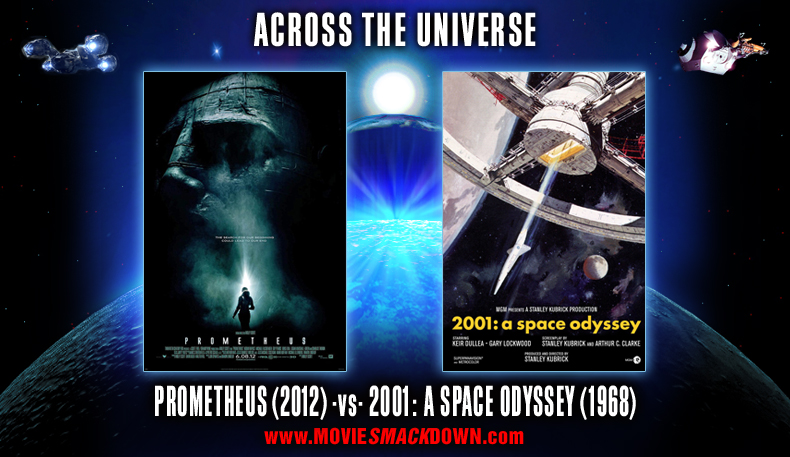

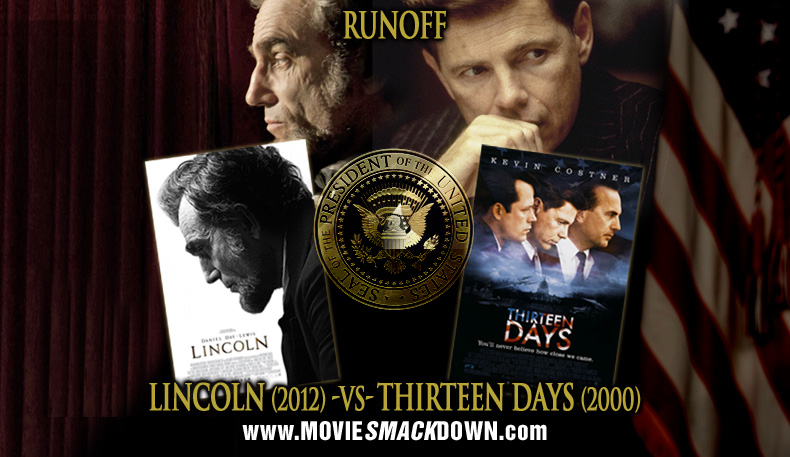
Sorry, late to the party but I think there is a better smackdown battle for Source Code; it is Deja Vu (2006). You have secret/special government entities, limited time frame to prevent the crime, protagonist falling in love, and sympathetic government figure helping the protagonist make the ‘hero’ call.
Not sure why Deja Vu gets overlooked as a film, but I put it very high on my list for enjoyment/escapism factor, which has no scaling for logic, science and other practical measures.
Agree that would have also been an appropriate Smackdown. I recall enjoying it as well, though I remember the ending not working for me, but it was quite a fun ride getting there. Still missing Tony Scott…
Gonna throw this out there, small point, Timecrimes is a Spanish film, not Mexican.
Thank you, Edgar. You are correct. My bad.
In case anyone’s wondering, it’s also really damn good.
Fixed. (–ed.)